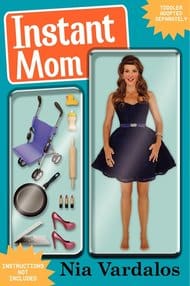The thing about Nia Vardalos’s book, “Instant Mom,” is that I want to push it onto people. Lots of people. People who have looked at my family and said, “Oh, we’ve thought about adoption.” People who I kind of suspect might, for one reason or another, be thinking about adoption. People who I, in my status as she-who-knows-best-about everything, think should maybe be thinking about adoption. (I would never really do that.)
Ms. Vardalos is, of course, an actor and screenwriter, and now, the mother of one daughter through adoption. She is also a veteran of fertility treatments — lots of fertility treatments. Every fertility treatment I’ve ever heard of and some I hadn’t. She went back again and again, to a self-punishing degree, and emerged grieving and without a baby — an experience she does not gloss over. She may tell you that her daughter is her destiny, but she will not tell you that she enjoyed getting there.
Even after Ms. Vardalos and her husband closed the chapter on infertility treatments, she came slowly to adoption, and even more slowly to the foster adoption program. She had misconceptions about who the children were and how the process worked, she told me, which made her reluctant. “For one thing, I thought in foster adoption, the children came to live with you for a while, then went back home, or might go back home,” she said. “I wasn’t aware of all the children who are already legally emancipated from their families.”
She also thought all, or at least most, of the children in a foster adoption program would have unmanageable problems. “But you know, some children have issues, some don’t — just like any children, biological, or adopted from anywhere,” she said. “That’s just life. “
“But I’m an average person who reads the news and listens to the stories, and of course, fear sells,” Ms. Vardalos said. “Even though I’m surrounded by happy adoptive families, I had only absorbed the negative ones. I’m a middle child Canadian, and I wasn’t looking for trouble. I’m not proud of it, but I want to be honest about it. I had fears.”
Those fears, and what happened after she put them aside, are the subject of Ms. Vardalos’s book, and of her new role as an advocate for foster adoption. Hers is the rare honest look at the adoption of a slightly older child — a child with a history; a child with memories; a child with reason to be angry about her life up until now, but without the ability to understand or put words to that anger. Her daughter, Ilaria, was almost 3 years old when she went to live with her new family — old enough to be confused and to grieve, and to take some of that grief out on her unprepared new mother and father.
Because I, too, am the adoptive parent of a slightly older child (my younger daughter was almost 4 when she came to us), every word of “Instant Mom” rang true for me, as Ms. Vardalos and her husband get through the difficult first days and weeks and find a way into their daughter’s heart. I asked her to describe the first few days after they took Ilaria home, and she laughed — a big, friendly laugh at how she used to be — and then got serious.
“We were suddenly and overwhelmingly in over our heads,” she said. “We were not equipped to help this poor, scared child with anything other than words we weren’t sure she understood, and caresses and kisses that she wouldn’t allow — and she was mad. She was really mad, and I understood. We would say it. ‘This must make you really mad. This must be really confusing.’ ”
Ms. Vardalos describes how they slowly helped Ilaria find enough confidence to relax, enough belief in them to sleep, and enough trust in her new family to speak and eventually to love. Of her choice to begin her life as a parent with a child who was past infancy and babyhood, she said: “I realized I didn’t necessarily see us with a baby. There are benefits to adopting a toddler. They can tell you what’s wrong. And — everything we did with our daughter was a first. Her first tooth fairy. Santa. If you adopt a 16-year-old, you teach them to drive for the first time. If you’re looking for firsts, there are always firsts.”
“Instant Mom” is the book I wish I’d had as we traveled that same road with our youngest daughter. If you have ever considered bringing a child who isn’t an infant into your family, it’s the book you’ll want to read. And if you just enjoy a good, honest memoir, whether it’s an experience you’ll ever share or not (hello, “Eat Pray Love”), it’s the book for you, too.
By KJ DELL’ANTONIA
Credit: NYTimes.com






